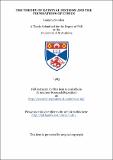The theory of rational decision and the foundations of ethics
Abstract
The primary concern of this thesis is to investigate what light (if any) the theory of rational decision can throw on certain problems in first-order ethics. In particular, it examines whether given a correct theory of decision we can determine which of the two major rivals in the field of contemporary ethics, utilitarianism and contractarianism, is the more adequate moral theory. I begin by outlining what I call orthodox decision theory and note from this theory together with a minimal characterization of what it is to make a moral judgement we can deduce utilitarianism. The apparent conflict between utilitarianism and our moral intuitions is then examined. I criticize a common response made by utilitarians to this conflict, namely, their recourse to the distinction between rule and act utilitarianism. But I then ask the question of whether this conflict really matters? I conclude that in a sense it does not. I then turn from a consideration of the implications of utilitarianism to its foundations, particularly, its foundations in orthodox decision theory. I attempt to establish that orthodox theory has empirical content and that it has been falsified. I also consider the theory from the normative standpoint and construct a prima facie case against it. I now consider the dispute between the contractarian and the utilitarian and note that it is essentially decision theoretic in character. From a consideration of what was found to be mistaken about orthodox theory I now argue for a defence of the selection rule for rational choice presupposed by contractarianism and thereby offer a (partial) defence of a contractarian theory of justice.
Type
Thesis, PhD Doctor of Philosophy
Collections
Items in the St Andrews Research Repository are protected by copyright, with all rights reserved, unless otherwise indicated.

